Censorship: An Unethical Violation of Natural Law
Censorship violates natural law through use of unethical force to restrict free speech instead of fostering open civil discourse aligned with ethical principles that could lead to mutual understanding
The Starfire Codes produces an audience-supported publication with a stellar podcast, consciousness-expanding daily spiritual content, and well-researched articles on forbidden but crucial topics.
If you love our work, please join our constellation of curious minds and venture into forbidden realms of knowledge.
Hit that like button!
Share with fellow seekers!
If you haven’t yet, please become a Paid Subscriber to support the cosmic quest for truth!
This is what we do full time. Thank you for all of the ways you support The Starfire Codes! It means the universe to us. 🌟
Lately, censorship has become an increasingly concerning issue. As the public discourse migrates to online platforms, private firms and governments have begun to limit some forms of speech in order to fight “hate” or “misinformation.” However, the essence of censorship violates natural law since it uses immoral compulsion as a means of muting individuals rather than upholding free and constructive debate.
What Is Censorship and Why Is It Unethical?
Censorship is centered on the notion of curtailing ideas and information considered to be unthinkable or dangerous by those in power. Sometimes people are jailed, books banned, websites blocked, search results manipulated, activists harassed and spied on. The tactics employed may differ but their consequences are similar; they inhibit some voices and stories from entering into public awareness.
This goes against natural law itself. As human beings we have an inherent right to think independently and exchange ideas openly as well as make our own judgements. Censorship has no faith in individuals’ ability to critically engage difficult information or think through things for themselves. It is immoral as it depends on coercion to suppress the decisions of others.
Censorship, rather than unearthing more truth, tends to push narratives deemed unacceptable by ruling elites into the shadows. Here, anger and resentment can grow without any constraints given by open public dialogues. Far from promoting greater social integration, censorship usually widens gaps among communities leading to conflicts instead.
Click here to find out more about booking a personal divination reading, having a dream interpreted, purchasing a natal astrology report, and more….
Why Censorship Creates More Problems Than It Solves
Many people think that there is need for censorship to stop the spread of hate speech or fake news on the internet. But then, it is difficult to define what exactly “hate speech” means because offense is a subjective term. Empowering authorities to determine which speech should be controlled gives room for exploitation and prejudice.
The censoring of misinformation can never be effective. This only serves to make those materials or speakers who have been prohibited more famous among their followers, more sought out as subject matter experts. Pushing people underground does not deny or prove wrong ideas; it just withdraws them from public scrutiny where no one can see what is happening.
More likely than not, however, closing down civil debate and discussion deepens divisions rather than healing them. This implies that censorship obstructs meaningful dialogue thus preventing understanding as an answer.
Although “good intentions” behind censorship may be emphasised, the means used are unethical. The historical records repeatedly indicate that limiting freedom of thought and expression results in greater suffering for human beings under autocracy.
Why Freedom of Speech Aligned With Natural Law is Paramount
Freedom of speech matters most when we do not agree with other people’s opinions about something. But when some individuals face restriction on their speech then this applies to everyone else too. If we cannot ask questions, challenge, or disagree with others, the fabric of society will corrode.
Removing censorship would not be an invitation to unregulated hate. Instead, it would involve enacting ethical guidelines based on principles of natural law such as critical thinking, personal accountability, love for humanity without prejudice in terms of ethnicity or religion, truth over fear, and non-violence.
From these shared values, discussions can occur freely. Understanding can triumph over prejudices while truth can be distinguished from falsehoods. Ethical open systems consistent with natural law have proven superior in securing peace and justice, as well as human rights, over the long haul.
Attempting to Control Speech By Force Is Itself Unethical
For some, censorship is acceptable when it aims to limit harmful speech. This view is flawed because any restriction of free speech through forceful means is unethical regardless of why it was done.
Censorship disempowers people and stops progress. Even if some language seems retrograde or ignorant, bringing more light to counter it is better than forcing ideas underground. Transformative change happens through open hearts and minds, not controlling systems.
Trying to censor others presupposes one’s own infallibility in relation to their “right” and our “wrong” positions. However nobody is all-knowing and development comes from embracing different perspectives. If we expect values like compassion and critical inquiry to prevail, then freedom of expression, rather than being curtailed, must be encouraged.
Justice Louis Brandeis remarked: "If there be time to expose through discussion the falsehood and fallacies, to avert the evil by the processes of education, the remedy to be applied is more speech, not enforced silence.”
The craving for control over other human beings indicates fear rather than ethical strength. And decisions made from fear often lead to tyranny, whether intended or unintended. Those who try to shut out opposition may think that they are on the right side of history. Nevertheless, exercising power so as to make others conform with your views amounts to authoritarianism. Regardless of how strictly we limit calls for violence, this will propel us down a slippery slope toward broad censorship instead of away from it.
Applying The Litmus Test Of Natural Law
Determining right from wrong on complex issues like censorship often seems subjective. However, natural law provides a universal litmus test - does an action align with ethical principles, or does it employ unethical coercion? When viewed from this lens, censorship clearly fails the test.
The desire to control what ideas can be expressed is itself an act of force. And the use of force to compel behaviors or restrict freedoms violates natural laws around free will and consent. Forcing individuals to silence themselves against their conscience through external pressure is unethical coercion, plain and simple.
It does not matter whether the reasoning seems justified or not. As soon as we employ heavy-handed force against the rights of others, we betray our own principles. Restricting speech requires the threat of punishment, loss of livelihood, or social ostracism. These are all forms of force leveraged to impose the will of authority figures upon the population.
And because such actions go against natural law, they often incur unintended karmic consequences. Those who drive censorship believe they serve ethical ends, viewing contrarians as ignorant or malicious. In reality, determinations of "right speech" versus "hate speech" are often biased and shift unpredictably. Well-meaning moral crusaders can easily become pawns used by the powerful to amass influence and weed out dissent.
Without realizing it, these overzealous censors are allowing themselves to become tools of oppression. They take on the karmic debt of restricting civil liberties and human rights in the name of some "greater good." But no matter how righteous the cause may seem, violating natural law is spiritually hazardous and breeds more darkness.
The litmus test is simple - does an action align with natural law by maximizing free will through ethical means? Or does it coerce conformity through force? Ethics grounded in natural law focus on critical thinking, compassion, facts over fear, and non-violence. In contrast, censorship betrays all of these principles and stacks up heavy karmic consequences, no matter how supposedly noble its ends. Those who live by unethical force often experience the boomerang effect down the line.
True Discourse Means Hearing Difficult Ideas
Silencing ugly ideas does not change hearts and minds, but civil discourse can. No one is sanctioning harm to others. Nonetheless, maybe we have ceased listening and engaging in discourse. Even “well-intentioned” censorship risks becoming moral grandstanding that divides instead of uniting.
In the search for lasting social transformation, taking the “high road” is often sitting through discomforts and being willing to empathize with experiences different from our own. This is often effective. Activist Daryl Davis didn’t make over 200 KKK members hang up their robes by censoring them. He listened to them and became friends with them instead, and they willingly gave him their robes. Reformers like Gandhi and Martin Luther King Jr. changed the world through courageous nonviolence as well.
Thus let us toward compassion and bravery and away from fear to free minds. Winning battles is about lighting candles not cursing the darkness. This means, if core principles of natural law prevail, more speech, not less, is still the right way forward.




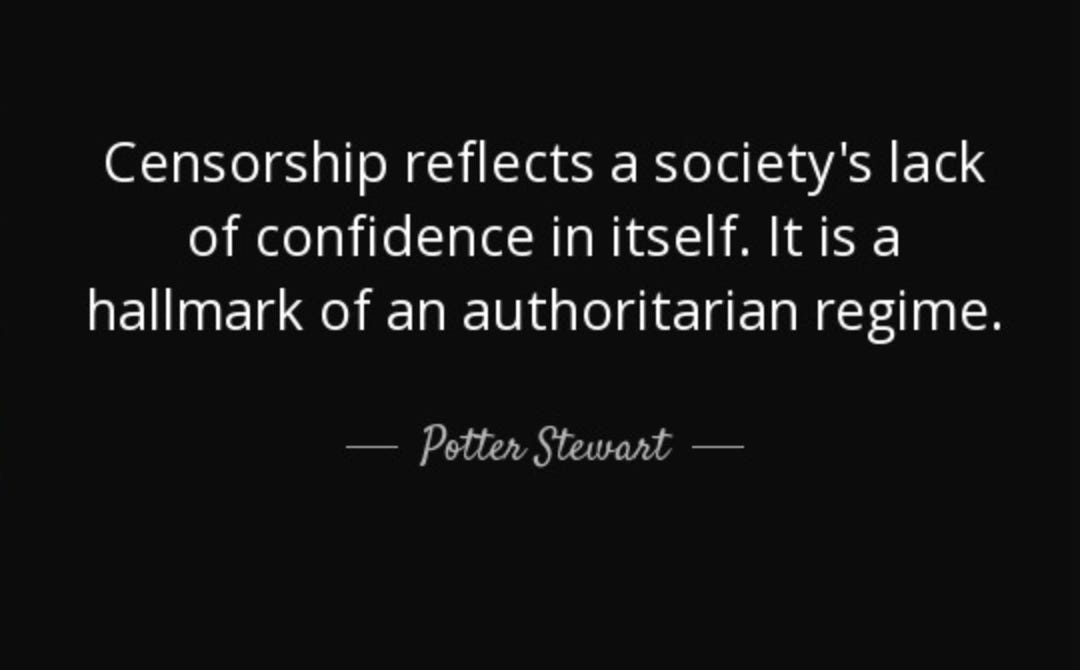
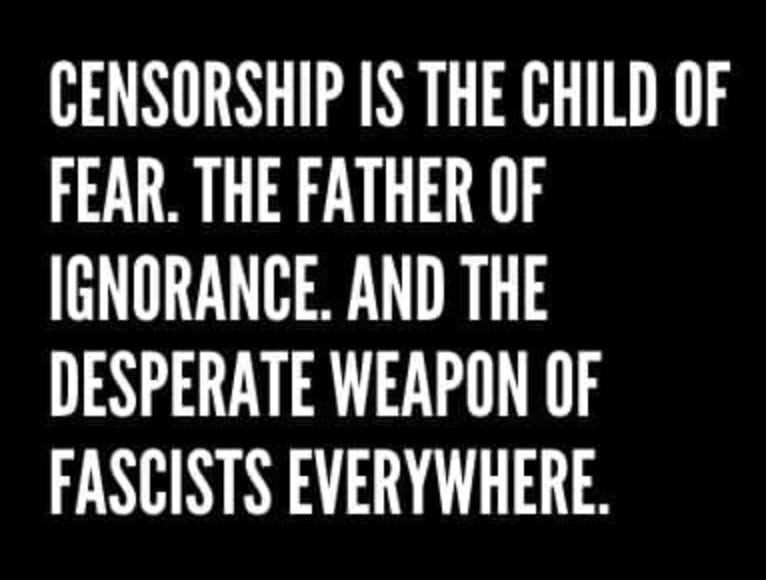
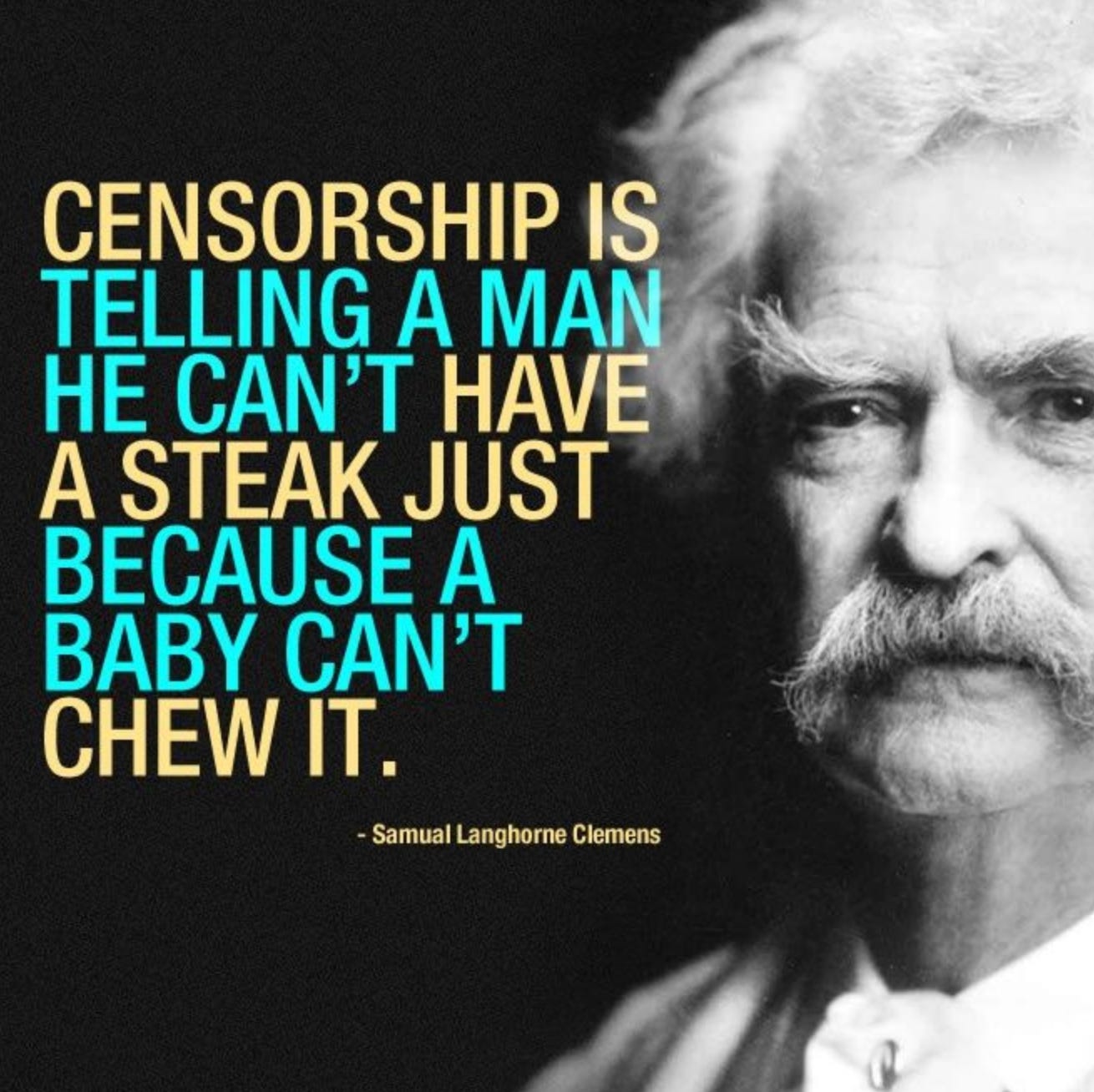

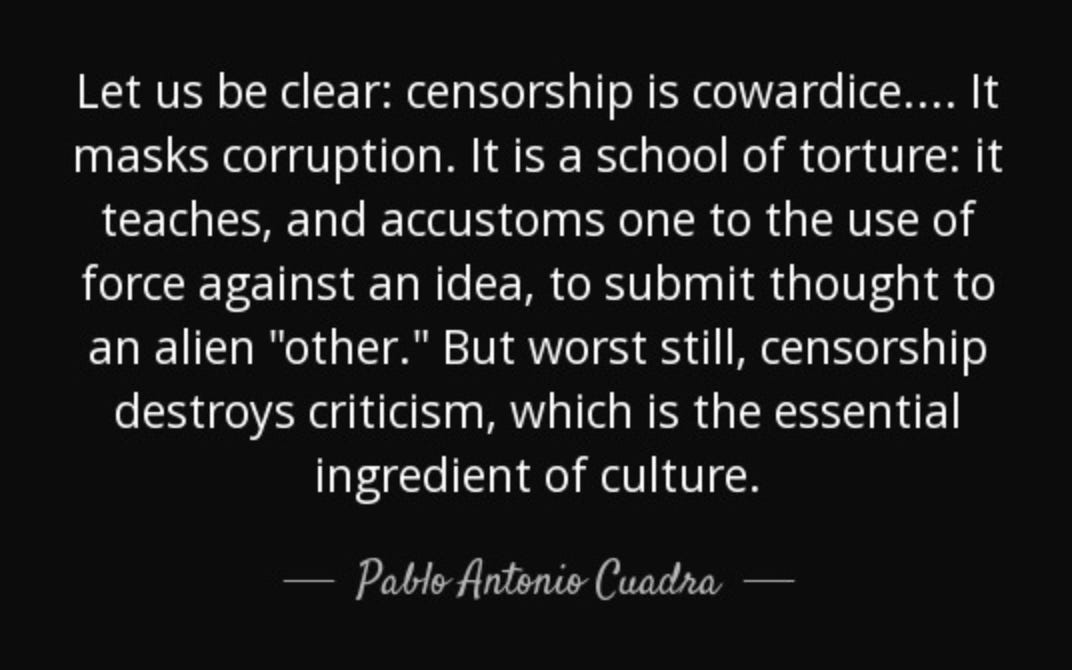
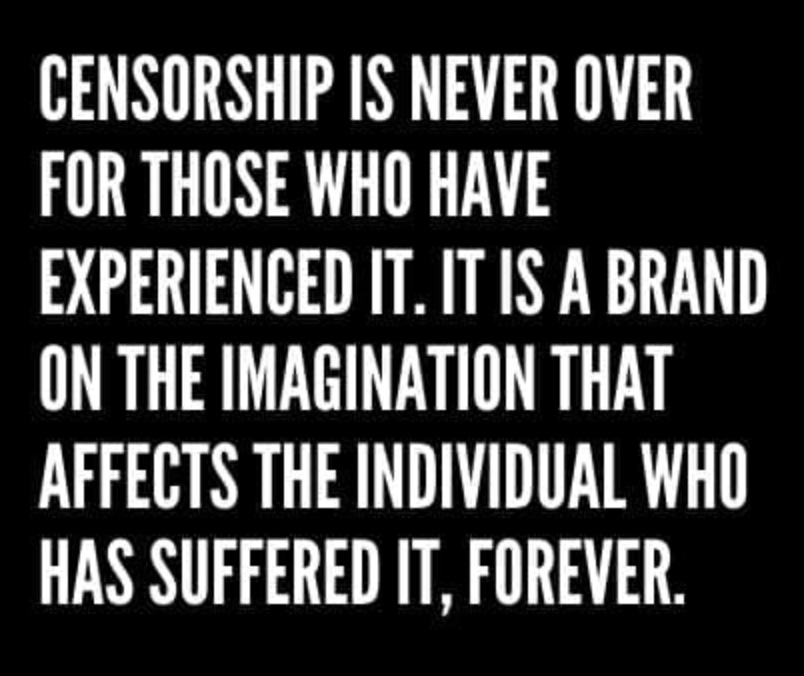
Brilliant writing!
The three Laws of Ethics (Natural Law expressed as the three things not to do):
1. Do not willfully and without fully informed consent hurt or kill the flesh of anOther
2. Do not willfully and without fully informed consent take or damage anything that does not belong to You alone
3. Do not willfully defraud anOther (which can only happen without fully informed consent)
Censorship robs Us of Our freedom to communicate, and defrauds the Ones kept from data. Indeed, censorship is grossly unEthical.
And while We're at it... The legal/governmental system is grossly unEthical - it's legal for Pfizer (and the rest) to lie, bait-and-switch, and otherwise defraud the public - with immunity! And that is just a single example of many thousands of unEthical things that are "legal." And don't get Me started on needed money to pay for justice...
Thus, being an Ethical One, I cannot consent to that whole system.
The Simplicity of Ethics (article): https://amaterasusolar.substack.com/p/the-simplicity-of-ethics